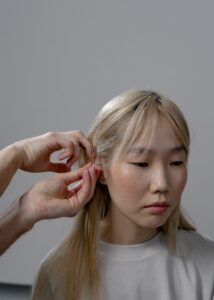Natural Scalp Care

DIY scalp masks are an excellent way to nourish and revitalize your scalp. They can help alleviate a variety of scalp issues, such as dandruff, dryness, and itchiness, while promoting healthy hair growth. Plus, making your own scalp masks at home is a cost-effective and natural alternative to expensive salon treatments. In this blog post, we’ll share three of the best DIY scalp masks for healthy hair.
1. Avocado and Honey Scalp Mask
Avocado is a natural source of vitamins A, D, and E, which are essential for healthy hair growth. It also contains healthy fats that can help moisturize and nourish the scalp. Honey, on the other hand, is a natural humectant that can help lock in moisture and prevent dryness. To make an avocado and honey scalp mask, you’ll need:
- 1 ripe avocado
- 2 tablespoons of honey
- 1 tablespoon of olive oil
Mash the avocado in a bowl until it is smooth. Add the honey and olive oil, and mix until well combined. Apply the mask to your scalp and massage it in using circular motions. Leave it on for 30 minutes before washing it out with a gentle shampoo.
2. Yogurt and Lemon Scalp Mask
Yogurt is rich in protein, which is essential for strong and healthy hair. It also contains lactic acid, which can help exfoliate the scalp and remove dead skin cells. Lemon, on the other hand, is a natural astringent that can help balance the pH of the scalp and prevent dandruff. To make a yogurt and lemon scalp mask, you’ll need:
- 1 cup of plain yogurt
- 2 tablespoons of fresh lemon juice
Mix the yogurt and lemon juice in a bowl until well combined. Apply the mask to your scalp and massage it in using circular motions. Leave it on for 30 minutes before washing it out with a gentle shampoo.
3. Coconut Oil and Tea Tree Oil Scalp Mask
Coconut oil is a natural source of medium-chain fatty acids, which can help moisturize and nourish the scalp. It also contains lauric acid, which has antibacterial and antifungal properties that can help prevent dandruff and other scalp conditions. Tea tree oil, on the other hand, has antimicrobial properties that can help alleviate scalp issues such as dandruff and psoriasis. To make a coconut oil and tea tree oil scalp mask, you’ll need:
- 2 tablespoons of coconut oil
- 5 drops of tea tree oil
Mix the coconut oil and tea tree oil in a bowl until well combined. Apply the mask to your scalp and massage it in using circular motions. Leave it on for 30 minutes before washing it out with a gentle shampoo.

Tips for Using DIY Scalp Masks
When using DIY scalp masks, it’s important to keep a few things in mind to ensure that you get the most out of them:
- Start with clean, dry hair: It’s best to apply scalp masks to clean, dry hair, as this will allow the mask to penetrate the scalp more effectively.
- Use gentle, circular motions: When applying the mask, use gentle, circular motions to massage it into the scalp. This will help improve blood flow to the scalp and promote healthy hair growth.
- Cover your hair: Once you’ve applied the mask, cover your hair with a shower cap or towel to keep the heat in. This will help the mask penetrate the scalp more deeply.
- Rinse thoroughly: After leaving the mask on for the recommended time, rinse it out thoroughly with a gentle shampoo. Be sure to remove all traces of the mask to avoid buildup.
In conclusion, DIY scalp masks are a natural and effective way to nourish and revitalize your scalp, while promoting healthy hair growth. By using natural ingredients that are rich in essential vitamins and minerals, you can help alleviate a variety of scalp issues, such as dryness, dandruff, and itchiness. Plus, making your own scalp masks at home is a cost-effective and natural alternative to expensive salon treatments.
In addition to the three DIY scalp masks we’ve shared in this post, there are many other natural ingredients that can be used to make effective scalp masks. For example, aloe vera, apple cider vinegar, and ginger are all known for their scalp-soothing properties.
When using DIY scalp masks, it’s important to keep in mind that they may not work for everyone. If you have a sensitive scalp or are prone to allergies, it’s always a good idea to patch test a small area of your scalp before using any new product.
In addition to using DIY scalp masks, there are other steps you can take to promote scalp health and healthy hair growth. These include:
- Eating a healthy diet that is rich in vitamins and minerals that are essential for hair growth, such as biotin, vitamin D, and iron.
- Avoiding harsh chemical treatments, such as perms and relaxers, that can damage the scalp and hair.
- Using gentle, sulfate-free shampoos and conditioners that are formulated for your hair type.
- Drinking plenty of water to keep the scalp hydrated.
By taking a holistic approach to scalp care and incorporating natural ingredients into your routine, you can help promote a healthy scalp and beautiful, healthy hair. DIY scalp masks are a great place to start, as they are easy to make and can be customized to meet your specific needs. So why not give one of these masks a try and see the difference it can make for your hair and scalp health?




